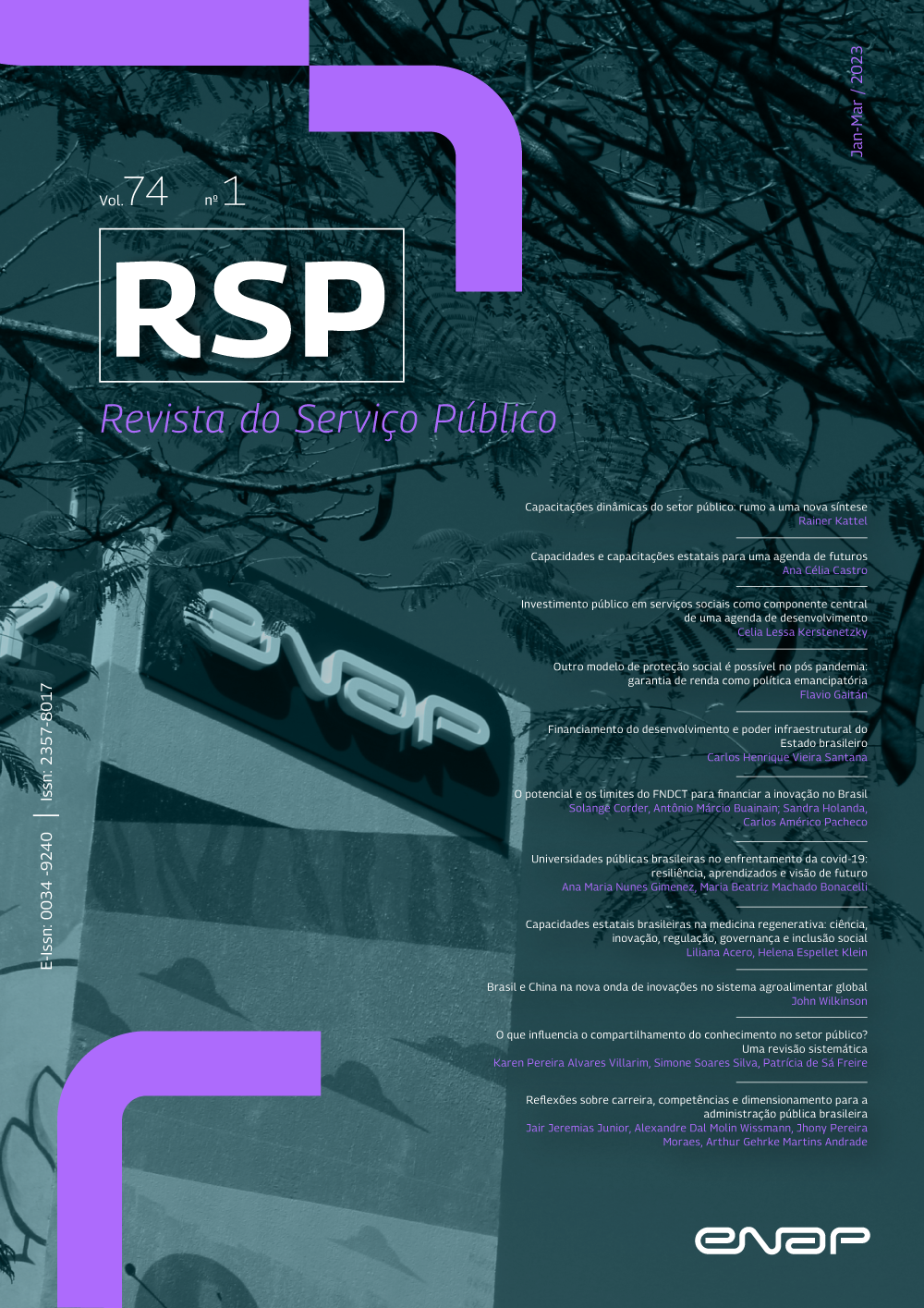Another model of social protection is possible
income guarantee as an emancipatory policy
Keywords:
social protection, income guarantee, paid work, emancipationAbstract
This article presents a normative discussion about alternatives for social protection in the post-pandemic context. To do this end, the work defends three assumptions: first; the importance of income guarantees to ensure the material conditions of existence; secondly, the need to decouple economic and social security from participation in market activities and, finally, the existence of welfare gaps that undermine the ability of protection systems to calibrate responses to social risks. The first section presents a brief discussion on social vulnerabilities and on forms of State intervention to guarantee social rights and living conditions. The second presents three income universalization alternatives in a normative exercise; the practice that Wright (2010) calls “real utopias”.
Downloads
References
ACEMOĞLU, D. (2021). Para revertir el aumento de la desigualdad hay que controlar estrictamente la automatización. Finanzas & Desarrollo, 6.
ACEMOGLU, D. & AUTOR, D.H. (2011), Skills, tasks and technologies: Implications for employment and earnings, Handbook of labor economics, 4, 1043-1171.
ADELANTADO, J.; J. A. NOGUERA; X. RAMBLA & Lluís SAEZ (1998), “Las relaciones entre estructura y políticas sociales: una propuesta teórica”, Revista Mexicana de Sociología, año LX, n. 3, pp. 123-156.
AfDB, ADB, BID, EBRD (African Development Bank Group, Asian Development Bank, Banco Interamericano de Desarrollo, European Bank for Reconstruction and Development). (2018). El futuro del trabajo: Perspectivas regionales. Washington, DC.
ALDERFER, C P. (1969). "An empirical test of a new theory of human needs". Organizational Behavior and Human Performance. 4 (2): 142–75.
ALKIRE, S., U. K. & Suppa, N. (2021). The Global Multidimensional Poverty Index (MPI) 2021, OPHI MPI Methodological Note 51, University of Oxford.
ANDER-EGG, E. (1984). Diccionario del Trabajo Social. El Ateneo. México.
ATKINSON, A. B. (2019). Measuring Poverty Around the World. Princeton University Press: New Jersey.
ATKINSON, A. B. (2002). How basic income is moving of the future policy agenda: News from the future. 9 Internacional Congress BIEN, Sept. 12-14, Ginebra, 2002
ATKINSON, A. B. (1996). The case for a participation income, The political quarterly, v. 67, n. 1, pp 67-70, 1996.
ATKINSON, A. B. (2015). Inequality: what can be done? Harvard University Press.
BECK, U. (1992). Risk Society. Towards a New Modernity. Londres: Sage Publications.
BITAR, S. El futuro del trabajo en América Latina Como impactará la digitalización y qué hacer? Diálogo Interamericano, DC, 2018
BOLTVINIK, J. (2007). Elementos para la crítica de la economía política de la pobreza. Desacatos, núm. 23, enero-abril 2007, pp. 53-86.
BOLTVINIK, J. (2005). Ampliar la mirada. Un nuevo enfoque de la pobreza y el florecimiento humano. Tesis para obtener el grado de doctor, Doctorado en Ciencias Sociales, CIESAS, Guadalajara. 2005.
BOSCH, M. ; PAGES, C.; RIPANI. L. (2018). El futuro del trabajo en América Latina y el Caribe. ¿Una oportunidad? BID: Washington D.C.
BOYER, R. (2007). Crisis y regímenes de crecimiento. Una introducción a la Teoría de la Regulación, Buenos Aires, Ceil-Piette/Miño y Dávila.
BOYER, R. (2008). O Brasil como o pioneiro no crescimento inclusivo da América Latina: O próximo passo da política social, Revista Plataforma Política Social, n. 8, pp. 6-17.
BRADSHAW, J. (1972a). Taxonomy of social need. In: McLachlan, Gordon, (ed.) Problems and progress in medical care: essays on current research, 7th series. Oxford University Press, London, pp. 71-82.
BRADSHAW, J. (1972b). The concept of social need. New Society (30 March).
CASASSAS, D. (2019). Libertad Incondicional: la renta básica en la revolución democrática. Barcelona, Editorial Paidós, 2019.
CASTEL, R. (2003). L’insécurité sociale: Qu’est-ce qu’être protégé? Seuil, Paris.
CECCHINI, S. & A. MADARIAGA (2011). Programas de Transferencias Condicionadas. Balance de la experiencia en América Latina y el Caribe. Santiago: Cepal – Asdi.
CEPAL (2022). Panorama Social de América Latina, 2021. (LC/PUB.2021/17-P), Santiago.
CEPAL (2021). Estudio Económico de América Latina y el Caribe. (LC/PUB.2021/10-P/Rev.1), Santiago, 2021.
CEPAL (2020). Enfrentar los efectos cada vez mayores del COVID-19 para una reactivación con igualdad: nuevas proyecciones. Informe Especial COVID-19, n. 5, Santiago, julio. 79,2% (491 millones de personas), ingresos bajos o medio bajos.
CONEVAL (2014). Medición multidimensional de la pobreza en México. El trimestre económico, v. 81, n. 321, pp. 5-42.
DANANI, C. (2017). Políticas Sociales universales. Una buena idea sin sujeto. Consideraciones sobre la pobreza y las políticas sociales. Sociedad, n. 37, pp. 77-94.
DOYAL, L. & GOUGH, I. (1991). A Theory of Human Need, Macmillan, Londres.
DOYAL, L. & GOUGH, I. (1984). A theory of human needs. Critical Social Policy, v. 4, n. 10, pp. 6-38.
ESPING ANDERSEN, G. (1990). The three worlds of welfare capitalism. Princeton, N.J.: Princeton University Press.
FERRERA, M. (2009). From the welfare state to the social investment state. Riviste Internacionale di Scienze Sociali, n. 3-4; pp. 513-528.
FREY, C. B. & OSBORNE, M. (2017). The Future of Employment: How susceptible are jobs to computerisation?, September, 2013.
Fumagalli, 2020
GALTUNG, J. & WIRAK, A. (1977). H. Human Needs and Human Rights-: A Theoretical Approach. Bulletin of Peace Proposals, v. 8, n 3, pp. 251-258.
GALTUNG, J. (1980). The basic needs approach. In: K. Lederer (ed.), Human Needs Cambridge, Mass, Oelgeschlager, Gunn and Hain.
GAMALLO, G. (2015). “Aproximación al concepto de brecha de bienestar”. En:
INFANTE, R. & KLEIN, E. (1991). Mercado latinoamericano del trabajo en 1950-1990. Revista de la CEPAL, n. 45, pp. 129-144.
KAKWANI, N. & SILBER, J. (2007). The Many Dimensions of Poverty. UNDP & Palgrave Mac Millan: Nueva York.
KILDAL, N. & KUHNLE, S. (2004). The Principle of Universalism: Tracing a Key Idea in the Scandinavian Welfare Model. In: Standing, G. (ed.), Promoting Income Security as a Right. Europe and North America. London: Anthem Press, pp. 303-326.
KORPI, W. & PALME, J. (1998). The paradox of redistribution and strategies of equality: Welfare State institutions, inequality and poverty in the Western countries. American Sociological Review, v. 63, n. 10, pp. 309-328.
LAUTIER, B. (2006). Una protección social mutualista y universal: condición para la eficacia de la lucha contra la pobreza. En: Lo Vuolo, Rubén (compilador). La credibilidad social de la política social en América Latina. Buenos Aires, Miño y Dávila, pp. 43-109.
LAVINAS, L. (2014a). La asistencia social en el siglo XXI. New left review, n. 84, pp. 7-48.
LAVINAS, L. (2014b). América latina: mínimos monetários em lugar da proteção social. Revista Política Social e Desenvolvimento, n. 8, pp.18-27.
LO VUOLO, R. M. (2016). El ingreso ciudadano en debate. Repensando el bienestar en el siglo XXI. Nueva Sociedad, n. 266, 2016. Edición online. Disponible en: https://bit.ly/3ny7nyJ. Acceso en: 3 Oct. 2020.
LUSTIG, N.; MARTÍNEZ PABON, V.; NEIDHÖFER, G. & TOMMASI, M. (2020). Short and long-run distributional impacts of covid-19 in Latin America. Working Paper 96, October (Revised June 2021)
MASLOW, A. (1943). A Theory of Human Motivation. Psychological Review, v. 50, pp. 370-396.
MASLOW, A. (1975), Motivación y Personalidad, Sagitario, Barcelona.
MAX-NEEF, M.; ELIZALDE, A. & HOPENHAYN, M. (1986), Desarrollo a Escala Humana: una opción para el futuro, CEPAUR-Dag Hammarskjöld Foundation, Uppsala.
MCADAM, D. (1982). Political Process and the Development of Black Insurgency. University of Chicago Press, Chicago
MCKINSEY (2017). A Future that Works: Automation, employment and Productivity, McKinsey.
MINSKY, H. (1986). Stabilizing an Unstable Economy. New Haven: Yale University¬ Press.
MINSKY, H. (1973). The Strategy of Economic Policy and Income Distribution. Annals of the American Academy of Political and Social Science, v. 409, pp. 92-101.
MITCHELL, W. F. (1998). The buffer stock employment model and the Nairu: the path to full employment. Journal of Economic Issues, v. 32, n. 2, pp. 547-55, jun.
MKANDAWIRE, T. (2005). Targeting and Universalism in Poverty Reduction. Ginebra: United Nations Research Institute for Social Development (UNRISD).
MOREL, N.; PALIER, B. & PALME, J. Towards a social investment welfare state? Ideas, Policies and Challenges. London: Policy Press, 2011.
NUSSBAUM, M. (2000). Women and human development. The capabilities approach. Cambridge: Cambridge University Press.
OCAMPO, J.A. (2008). Las concepciones de la política social: universalismo versus focalización. Nueva Sociedad, n. 215, pp. 35-61.
OCDE (2019). El futuro del trabajo. Perspectivas de empleo de la OCDE. Paris, OCDE.
OIT. (2022). Panorama Laboral de América Latina y el Caribe 2021. Lima, Oficina regional de la Organización Internacional del Trabajo.
PAUGAM, S. (2003), Desqualificação social: ensaio sobre a nova pobreza, São Paulo, Cortez.
PEDERSEN, D. (1998). El impacto de la pobreza, el racismo y la violencia política sobre la salud mental de los pueblos latinoamericanos. An. Salud Mental, v. 14, n. 1-2, 1998, pp. 103-128.
PÉREZ, C. (1985). Microelectronics Long Waves and World Structural Change: New Perspectives for Developing Countries. World Development, v. 13, n. 2, pp. 441-463.
PIERSON, Copying with permanent austerity: welfare state restructuring in affluent democracies. Revue Française de Sociologie, v. 43, n. 2, 2002, p. 369-406
PWC. (2017). Workforce of the future. The competing forces shaping 2030, PWc.
RAVENTÓS, D. & WARK, J. El debate de la RB: aspectos políticos, filosóficos y económicos En: IV Monográfico Sin Permiso, 2016, pp. 68-75.
RIDLEY, M. Poverty, depression, and anxiety: Causal evidence and mechanisms, Science, v. 370, n. 6522, 2020.
SARTORIO, L. (2019). ¿Qué sabemos (y qué no sabemos) sobre el futuro del trabajo? Nueva Sociedad, n. 279, pp. 73-86.
SCHUMPETER, J. A. (1994 [1942]). Capitalismo, socialismo y democracia. Londres: Routledge.
SEN, Amartya (2000). Desarrollo y libertad, Bogotá: Planeta.
SEPÚLVEDA, M. (2014). De la retórica a la práctica: el enfoque de derechos en la protección social en América Latina. Serie Políticas Sociales, n. 189. Santiago de Chile: Comisión Económica para América Latina y el Caribe (cepal).
TCHERNEVA, P. (2018). The Job Guarantee: Design, Jobs, and Implementation. Working Paper n. 902, Levy Economics Institute of Bard College.
VALENCIA LOMELÍ, E. & FOUST RODRÍGUEZ, D. (2010). ¿Es pertinente pensar hoy en el universalismo en México? In: Valencia Lomelí, Enrique (coord.). Perspectivas del universalismo en México. Guadalajara, México: ITESO-Fundación Konrad Adenauer, pp. 7-21.
VAN PARIJS, P. (1996). Real Freedom for all. What (if anything) can justify capitalism. Clarendon Press, Oxford, 1995.
VAN PARIJS, P. (2001). What's Wrong with a Free Lunch? Cohen and Royers (ed) Boston, Beacon Press.
WRAY, Randall (2000). Keynes y el pleno empleo: una lectura contemporánea. Comercio Exterior, v. 50, n. 12, pp. 1045-1052.
WRAY, R. (1998). Understanding Modern Money: The Key to Full Employment and Price Stability. Cheltenham, UK: Edward Elgar.
WRIGHT, E. O. (2010). Envisioning Real Utopias, London, Verso.
Downloads
Published
How to Cite
Issue
Section
License
Copyright (c) 2023 Revista do Serviço Público

This work is licensed under a Creative Commons Attribution-NonCommercial-ShareAlike 4.0 International License.
- A RSP adota a licença Creative Commons (CC) do tipo Atribuição – Uso Não-Comercial (BY-NC).
- A licença permite que outros remixem, adaptem e criem obra licenciada, sendo proibido o uso com fins comerciais.
- As novas obras devem fazer referência ao autor nos créditos e não podem ser usadas com fins comerciais, porém não precisam ser licenciadas sob os mesmos termos dessa licença.
- Ao publicar o artigo na RSP, o autor cede e transfere para a ENAP os direitos autorais patrimoniais referentes ao artigo.
- O artigo publicado na RSP não poderá ser divulgado em outro meio sem a devida referência à publicação de origem.
- O autor que tiver o artigo publicado na RSP deverá assinar o Termo de Concessão de Direitos Autorais (em momento oportuno a editoria da Revista entrará em contato com o autor para assinatura do Termo).



